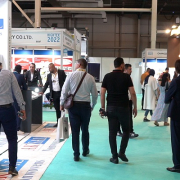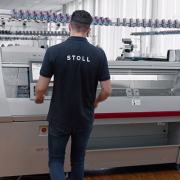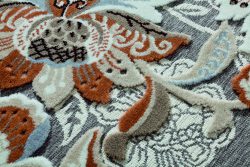Evteks and Dakotek Break Grounds in Textiles
Coming up with an innovation in this year’s Evteks exhibition, Evteks has introduced its products through virtual reality glasses. Evteks attracted great interest from customers with this presentation.
Starting his career in 1998 by founding Evteks Tekstil Ltd., İsa Dal continues its success with his new company Yenita Tarım Organik Tarım ve Seracılık Ltd., which he founded last year, and Dakotek Ltd., which focuses on medical technical textiles, founded in 2010. İsa Dal is the Chairman to the Textile and Apparel Industrialists Union of Denizli since February 2010, and a delegate for the Denizli Exporters Union to the Turkey Exporters Assembly since 2010, a board member at Fashon and Apparel Federation of Turkey and a commission member at the Union of Chambers and Commodity Exchanges of Turkey (TOBB). Mr. Dal is also board member at the Clothing Manufacturers Uninon of Turkey and at the Home Textile Industrialists and Businessmen Union. Also as an industry representative for TOBB, he is a commission member for the R&D centers supported by the Ministry of Science, Industry and Technology.
We visited Evteks’ booth at the Evteks Exxhibition and held an interview with İsa Dal on technical textiles. We also watched the introduction of Evteks company with virtual reality glasses.

You have introduced your products to your customers with virtual reality glasses for the first time this year at Evteks Exhibition. Can you tell us about this innovation and what advantages it offers?
This year, we made an innovation in the design at Evteks Exhibition. With this process, we introduced our products by addressing to the senses of sight, touch and hear thanks to the virtual reality glasses. We have preferred a more environmentally friendly method by making a sustainable life cycle in design. We introduced six sets of collections at the exhibition.
Firstly, if we produced this collection and exhibit its prototypes, we would need a much larger area. Secondly, we would need more time to prepare them. Thirdly, it was going to cost as much as this exhibition event. With virtual reality, we have significantly reduced such costs. We have also while eliminated some things, which significantly affect the costs like samples when offering these designs to customers. The customers were able to see and touch our products, which they have selected in the catalogue and design.
As a founder of two textile companies, Evteks and Dakotek, how do you define technical textiles? Can you evaluate the technical textile in terms of the production of your two companies?
I define technical textiles as industrial textiles. In the field of domestic textiles, Messe Frankfurt created two brands like Hometech and Sportech. But definitely I do not find it correct that the functional textiles are defined as technical textiles. In industrial terms, technical textiles come to the fore with features, which require strength and functionality in the industry. For example, textile products such as automotive, marine, mountaineering require more power, parts and performance. However, when we consider home textiles and apparels as a fashion sector, they are not so much in demand. The consumer hesitates when slightly functionalized components are included. Buyers do not seem very open to innovation in this area.
Last year, you received the Istanbul Chamber of Industry’s Environment Award. Can you tell us about the features of this award-winning product?
This product consists of around 18 functions, added to a 100% cotton product. This eco-friendly and anti-bacterial fabric is capable of electro-magnetic shielding. The product is anti-bacterial at a rate of around 85%.
In our project in the contest, we focused on whitening the woven fabrics woven by using boron components with a different technique without harming the nature.
Can you tell us about your current projects and what kinds of demands you receive for your production?
Currently we have 16 ongoing R&D projects. These pertain to very serious issues, out of necessity, each one demanded from us by the industry. On the one hand, we are working on products to improve the quality of life. But we are experiencing problems in commercializing them. No matter how much you prove your products in laboratory conditions, it is impossible to change some clichés. In times of stagnation, big buyers do not want to make mistakes. However, they avoid mistakes when they buy conventional standard products. As long as the demands are such low, innovative textiles cannot seize their place around the world.
Long term patients have pressure sores due to immobility. And you have developed a special fabric to prevent such cases. To which countries do you mainly export this product?
We continue exporting our products mainly to the USA, Germany and Switzerland. Also, we have transformed the pressure sore bedside sheets into clothes. This product of ours started to receive very good demands.
Robes and T-shirts that you have developed for the visually impaired people are groundbreaking products in Turkey. Can you tell us about this project?
I decided to develop such a project when my Turkish painter friend Türel Süt, who is living in England, impressed me with his embossed, scented and audible pictures for the visually impaired. My friend and I agreed to produce fabrics with smells according to colors. Seven years ago we produced special robes for the center for the visually impaired in Switzerland. Smells are encapsulated inside microcapsules in these custom-made fabrics. As you touch it, the microcapsules explode and smell spreads.
This was a project for sense of colors for the visually impaired people who did not have the chance to see colors. When you touch the orange arm in these colorful robes, it spreads the smell of orange. On the other arm in white color has the vanilla scent. When you touch the green part in the body, it spreads the apple smell. We’ve put these robes on the blind people there. It was an amazingly exuberant moment. For us, it was a social responsibility project rather than a commercial product.
But these products have a low washing resistance. After all, friction causes the capsules to explode. And when you put them in a laundry machine, it will all explode. We continue working on microcapsules. At the same time, we continue our production.
Interview: Kübra Karaca











